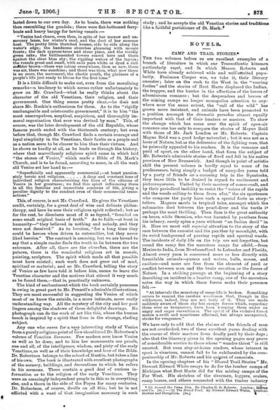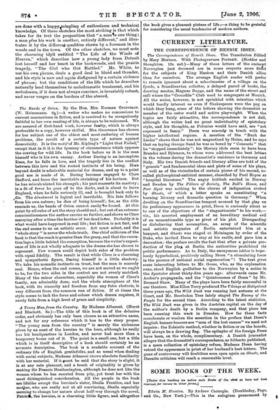NOVELS*
CAMP AND TRAIL STORIES' Tun two volumes before us are excellent examples of a branch of literature in which our Transatlantic kinsmen particularly expel, and in which Messrs. Roberts and White have already achieved wide and welr-trtbrited popu- larity. Fenimore Cooper was, we take it, their literary. ancestor ; later on the rush to the West in the "roaring forties" and the stories of Bret Harts displaced the Indian, the trapper, and the hunter in the affections of the lovers of adventurous romance ; but the desperadoes and heroes of the mining camps no longer monopolise attention to any- where near the same extent, the "call of the wild" has grown more insistent, and animals have been promoted to a position amongst the dramatis persoriae almost equally important with that of their hunters or masters. To show the change which has come over the spirit of open-air romance one has only to compare the stories of Mayne Reid with those of Mr. Jack London or Mr. Roberts. Captain Mayne Reid was a good hedge naturalist ; but it was not as a lover of Nature, but as the delineator of the fighting man, that he primarily appealed to his readers. It is the romance and peril of sport, on the other hand, that form the subject of Mr. Roberts's admirable stories of flood and fell in his native province of New Brunswick. And though in point of artistic skill the present volume is hardly equal to some of its predecessors, being simply a budget of camp-fire yarns told by a party of friends on a canoeing trip in the Squatooks, they leave little to be desired in regard to excitement and picturesqueness. United by their mastery of canoe-craft, and by their periodical inability to resist the "voices of the rapids and the woods calling to them from afar," the six sportsmen who compose the party have each a special forte as story- tellers. Magnus excels in tropical tales, amongst which the submarine duel between the pearl-diver and the turtle is perhaps the most thrilling. Then Sam is the great authority on bears, while Sliranion, who was haunted by panthers from his infancy, rarely spins a yarn without "an Indian devil" in it. Here we must call especial attention to the story of the race between the canoeist and the panther by moonlight, with its weird background of purring rapi ds and spectral woods. The incidents of daily life on the trip are not forgotten, but round the camp fire the narrators range far afield,—from Mexico to India, from Newfoundland to Labrador and Florida, Almost every yarn is concerned more or less directly with formidable animals—pumas and wolves, bulls, moose, and caribou—and none are free from the element of peril or conflict between man and the brute creation or the forces of Nature. In a striking passage at the beginning of a story describing an incident in a lumber camp, one of the narrators notes the way in which these forces make their presence felt :—
"At intervals the monotony of camp-life is broken. Something occurs to remind the careless woodsmen that, though in the wilderness, indeed, they are not truly of it. They are made suddenly aware of those shy but savage forces which, regarding them ever as trespassers, have been k eeping them under an angry and eager surveillance. The spirit of the violated forest makes a swift and sometimes effectual, but always unexpected, stroke for vengeance."
We have only to add that the claims of the friends of man are not overlooked, two of these excellent yarns dealing with
the rescue of their masters from deadly peril by their dogs ; also that the itinerary given in the opening pages may prove of considerable service to those whose " wander-thirst" is still unsated. But even stay-at-home readers, whose interest in sport is vicarious, cannot fail to be exhilarated by the com- panionship of Mr. Roberts and his quiptet of canoeists.
In the opening chapters of his " Blazed Trail Stories " Mr. Stewart Edward White essays to do for the lumber camps of Michigan what Bret Harts did for the milting camps of the Far West. His sketches of the rivermen, loggers, scalers, camp bosses, and others connected with the timber industry.
• (1) Around the Camp Firs. By Charles G. D. Roberts. London larrap and Co. Pal —(2) The Blared Trail. By Stewart Edward White, ondont Hodder and Stoughton. [as.]
•
are done with a happymingling of enthusiasm and technical knowledge. Of these addles the most striking is that which takes for its text the proposition that "a manta one thing ; a man plus his work is another, entirely different," and illus- trates it by the differe4 qualities shown by a foreman in the woods and in the town. Of the other sketches, we must note the charming idyll entitled " The Life of the Winds of Heaven," which describes how a young lady from Detroit lost herself and her heart in the backwoods, and the prairie tragedy, "The Girl who Got Rattled." .Mr. White, to use his own phrase, deals a good deal in blood and thunder, and his style is now and again disfigured by a certain violence of phrase; but the conditions of the life which he describes naturally lend themselves to melodramatic treatment, and his melodrama, if it does not always convince, is invariably robust, and never verges on the borders of the absurd.







































 Previous page
Previous page